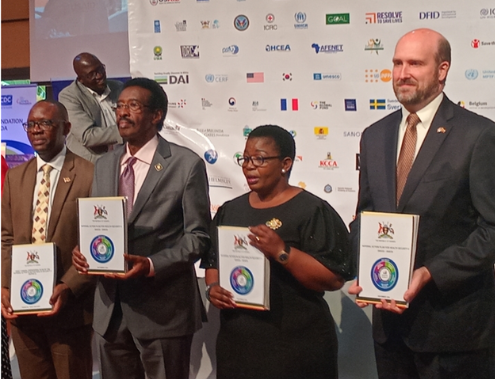Minister Lumumba calls for stronger health security measures in Uganda

The Minister for General Duties, Ms. Justine Lumumba, has called on the government of Uganda to prioritise health security in advance as the key strategy to avert the challenges of unpreparedness during the launch of the Second Uganda National Action Plan for Health Security at Speke Resort Hotel, Munyonyo.
During the launch of the Second Uganda National Action Plan for Health Security (NAPHS II) at Speke Resort Hotel, Munyonyo, on December 12, 2023, the Minister for General Duties, Ms. Justine Lumumba, urged the Ugandan government to prioritize health security in advance as a crucial strategy to avoid the issues associated with unpreparedness.
She urged the government to continue integrating health security principles into operational plans, policies, and budgets. “Health security is not the responsibility of one sector alone; it is a collective obligation that requires engagement from every corner of the governance framework,” Ms. Lumumba said.
“I call on the public to embrace the principles of preparedness, vigilance, and resilience. The health of our nation depends on each of us playing our part, whether it is through adopting preventive measures, staying informed, or supporting community health initiatives. Together, we can ensure that Uganda is strong, resilient, and ready in the face of health challenges,” she added.
The US Ambassador to Uganda, Mr. William Popp, highlighted the importance of phasing out wildlife trafficking in Uganda’s game parks, reserves, and zoos. He noted that some animals pose a threat to public health security by potentially transmitting diseases to humans.
“We have worked together to enhance efforts against wildlife trafficking with the Uganda Wildlife Authority. This effort also improves global health security, as wild animals are vectors of pathogens that cause diseases such as Marburg, Ebola, SARS, and influenza,” Mr. Popp said.
He also urged the government to support the inclusion of young people, refugees, organisations, and institutions in developing healthcare innovations, which would improve health and well-being and increase access to technology for all citizens.
Dr Daniel Kyabayinze, Director of Public Health, emphasised the need for strategic planning for health security, noting that it is crucial for the sustainable well-being of the population. He pointed out that the previous plan (NAPHS I) faced challenges related to poor funding.
“The launch of NAPHS II gives the government a chance to plan ahead, allocate resources in advance, and ensure that, in the event of an outbreak, we have resources from day one to start responding. We cannot plan to address issues once they have occurred,” Dr Kyabayinze said.
The National Action Plan for Health Security was first launched in 2018-2023 but faced challenges such as low funding, lack of awareness about the campaign, and the impacts of climate change. Despite these obstacles, the plan helped mitigate Uganda’s health emergencies, including outbreaks of Ebola, COVID-19, Mpox, Marburg, and other diseases.
The newly launched plan (2024-2029) is focused on equipping individuals and local groups with the knowledge and tools needed for disease prevention, early detection, and resilience building.
“We are empowering Ugandans to take an active role in safeguarding their health. A well-informed and engaged population is our greatest asset in preventing public health crises,” Ms Lumumba said.







